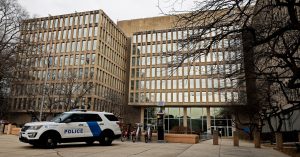Of the seven priority items Gov. Greg Abbott announced Sunday for state lawmakers to consider, one was the creation of a Texas Cyber Command that would be headquartered in San Antonio to help fight off attacks from hostile foreign nations like Russia, China and Iran.
“[There is] a problem that’s on the rise dramatically in the state of Texas, and candidly across the country, and that is the number of cyberattacks,” Abbott said in his sixth State of the State address in Austin on Sunday evening.
“These cyberattacks in just the past week or so … has hit a city, has hit a hospital, has hit a prominent business, and this happens week after week, and it’s increasing,” he added.
Other emergency items Abbott included in a flurry of announcements included cutting property taxes, investing in the state’s water infrastructure, increasing teacher pay and more.
The governor’s designation of those topics as emergency items allows lawmakers to circumvent the constitutional ban on passing any legislation in the first 60 days without 80% support of both chambers, fast-tracking items through the legislative process.
The current session of the Legislature began Jan. 14 and runs through June 2. In 2021, Abbott designated five emergency items for lawmakers to vote on within the first 60 days of the session.
The cyberattacks originate in China, Iran, Russia and other places, Abbott said, and could cripple the state’s power, water and transportation systems.
“We must protect Texans from emerging threats by deploying cutting-edge capabilities to secure Texas infrastructure,” he said.
The Texas Cyber Command will “leverage the expertise and resources” of the University of Texas at San Antonio and other entities.
In addition to helping the state prepare for cyberattacks through various exercises, the command will be set up to respond to cyberattacks and defend against the effects.
“It goes to show you that there are things that Republicans and Democrats, and even governors and mayors, can agree on in Texas, and that’s one of them that I will work with Governor Abbott to complete because I think that’s the right idea,” said Mayor Ron Nirenberg.
UTSA President Taylor Eighmy thanked Abbott via X for the opportunity to advance cyber innovation to protect the state. Eighmy was recently named acting head of UT Health San Antonio, the first president of the recently merged UTSA-UT Health San Antonio integrated university.
In January 2023, UTSA opened a $91.8 million National Security Collaboration Center and School of Data Science in downtown San Antonio at 506 Dolorosa St.
Port San Antonio President and CEO Jim Perschbach said he is grateful Abbott made the Texas Cyber Command in San Antonio a priority of the 89th Legislative Session.
“We believe the Governor’s plan will continue to grow our community’s capabilities and showcase the value of UTSA and the other nationally recognized cybersecurity programs in San Antonio,” he said.
“It will also bolster the Port’s value proposition as we work to advance our concept for a consolidated Air Force cybersecurity center.”
The governor’s announcement did not state where in San Antonio the command would be located if lawmakers follow through and send a bill to his desk.
A year ago, the Air Force announced that the 16th Air Force (AFCYBER) based at Joint Base San Antonio would be elevated to command status in recognition of the “rapidly evolving character of war.” The 16th Air Force focuses on information warfare in the modern age, which includes cyberspace operations; electronic warfare; information operations; and intelligence, surveillance, and reconnaissance.
Port SA leaders proposed building a state-of-the-art, secure campus for the command and related units, as well as partner federal agencies. The Port offered through an intergovernmental support agreement to design and build the campus while the federal government would pay for it.







